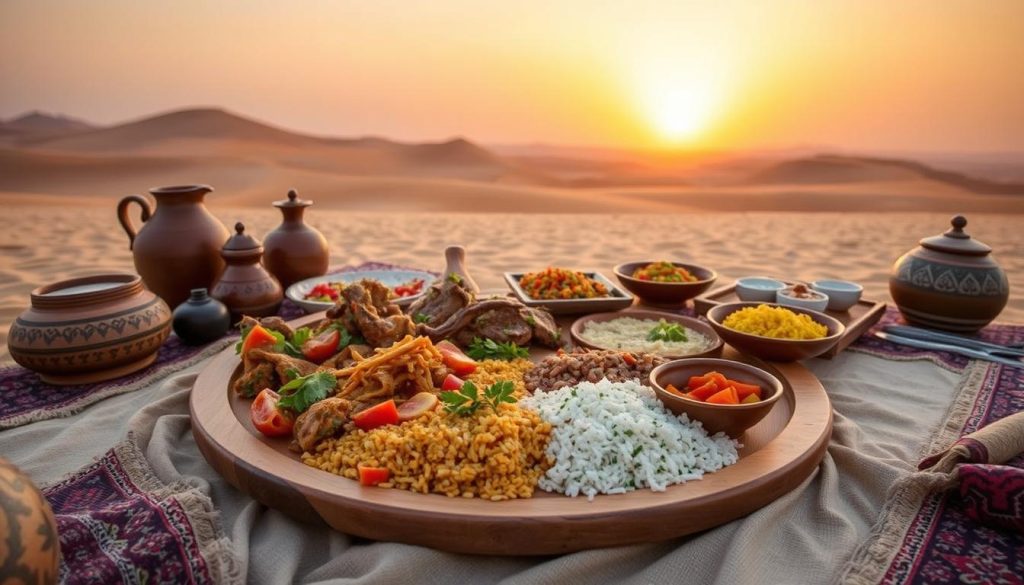Have you ever paused to consider that the traditional Bedouin dishes, passed down through generations, offer not just a culinary experience but a profound insight into the rich cultural tapestry of Dubai, allowing you to connect deeply with the region’s heritage while savoring flavors that have stood the test of time?
Savoring Bedouin Flavors in the Heart of Dubai
Dubai, a city renowned for its towering skyscrapers and luxurious lifestyle, also harbors a rich tapestry of cultural heritage waiting to be explored. Among its many traditions, the Bedouin culinary experience stands out as a testament to the region’s nomadic roots and deep-seated hospitality. One of the most authentic ways to immerse oneself in this tradition is through the Al Marmoom Oasis Experience. Here, visitors are welcomed into a traditional Bedouin camp, where they can indulge in a buffet dinner that showcases the simplicity and richness of Bedouin cuisine. The experience is further enriched by live cooking demonstrations, offering insights into age-old cooking techniques that have been preserved over generations.
A Morning with the Bedouins: Breakfast and Beyond
For those seeking a more immersive experience, the Morning Desert Safari offers a unique opportunity to delve into Bedouin culture. This journey begins with a camel ride through the serene desert landscape, leading to a Bedouin village where guests can partake in a traditional Emirati breakfast. The meal, often consisting of dishes like harees and balaleet, provides a flavorful introduction to the Bedouin way of life. Beyond the culinary delights, visitors can engage with Bedouin storytellers, gaining insights into their nomadic lifestyle, traditions, and the challenges they faced in the harsh desert environment.
Al Khayma Heritage Restaurant: A Culinary Time Capsule
Nestled in the heart of Dubai, the Al Khayma Heritage Restaurant offers a dining experience that transports guests back in time. Set within a traditional Emirati house, the restaurant serves dishes that have been staples in Bedouin households for centuries. From slow-cooked lamb to fragrant rice dishes, every meal is a celebration of flavors and traditions. The ambiance, complemented by traditional music and decor, provides a holistic experience that appeals to both the palate and the soul.
Understanding the Bedouin Culinary Philosophy
At the core of Bedouin cuisine lies a philosophy of simplicity, sustainability, and resourcefulness. Living in the desert meant limited access to resources, leading to the development of dishes that made the most of available ingredients. Staples like dates, milk, and meat were combined in innovative ways to create meals that were both nourishing and flavorful. Techniques like slow-cooking and underground baking not only enhanced the taste but also ensured that food could be preserved for longer durations.
The Role of Food in Bedouin Hospitality
In Bedouin culture, food is more than sustenance; it’s a symbol of hospitality and community. Guests are often greeted with dates and Arabic coffee, a gesture that signifies warmth and welcome. Meals are communal affairs, with dishes placed at the center and shared among all present. This practice fosters a sense of unity and emphasizes the importance of togetherness, values that are deeply ingrained in Bedouin society.

Modern Interpretations: Bridging Tradition and Contemporary Tastes
While traditional Bedouin dishes remain popular, there’s a growing trend of modern interpretations that blend age-old recipes with contemporary culinary techniques. Restaurants across Dubai are experimenting with presentation and fusion, introducing Bedouin flavors to a global audience. This evolution ensures that the rich culinary heritage continues to thrive, appealing to both purists and adventurous foodies alike.
Participating in Culinary Workshops
For those eager to take a piece of the experience home, several establishments offer culinary workshops focused on Bedouin cuisine. These sessions provide hands-on training in preparing traditional dishes, from kneading dough for flatbreads to mastering the art of spice blending. Participants not only learn recipes but also gain a deeper appreciation for the cultural significance behind each dish.
Seasonal Delights: Exploring Bedouin Cuisine Through the Year
Bedouin cuisine is also influenced by the seasons, with certain dishes reserved for specific times of the year. For instance, during Ramadan, special meals are prepared to break the fast, incorporating ingredients that provide energy and hydration. Understanding these seasonal variations offers a more comprehensive insight into the adaptability and depth of Bedouin culinary traditions.
Sustainability and Ethical Eating in Bedouin Traditions
Long before sustainability became a global concern, Bedouins practiced ethical eating out of necessity. Their diet emphasized minimal waste, with every part of an animal utilized and leftovers repurposed. This approach not only ensured survival in the harsh desert environment but also fostered a deep respect for nature and its resources. Modern diners can draw inspiration from these practices, embracing a more sustainable approach to food consumption.
Embarking on Your Culinary Journey
Exploring Bedouin culinary traditions in Dubai offers more than just a taste of delicious food; it’s an invitation to connect with a rich cultural heritage that has shaped the region’s identity. Whether you’re savoring a meal under the stars at a desert camp or learning to prepare traditional dishes in a workshop, each experience provides a deeper understanding of the values, history, and resilience of the Bedouin people. So, the next time you find yourself in Dubai, take a step beyond the usual tourist trails and embark on a culinary journey that promises both flavor and enlightenment.
This article was crafted by the www.few.ae team, dedicated to bringing you authentic insights into the rich tapestry of Emirati culture.
